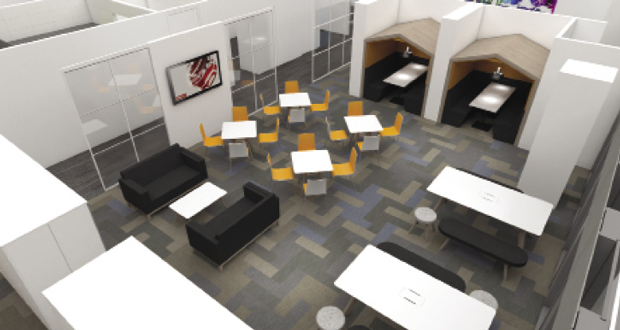ETL’s Director of Property Stephen Edgar, Project Associate Director Donna Fitzpatrick, and Programme Associate Director Maeve Dunne outline the cost saving opportunities for NHS Trusts in relocating and optimising office space
COVID-19 has understandably put a huge strain on the NHS but the successful adoption of wholescale home working means there’s an opportunity for Trusts to make savings in office space by enabling staff to adopt new ways of working. For employees this may mean a reduction in their journey times and improved wellbeing, while Trusts can reap the benefits of improved connectivity and sustainability.
The support services in NHS Trusts are typically based in large open plan areas, with organically grown workspaces that are co-located within clinical buildings that feature large amounts of storage and often decades of accumulated notes, reports and papers. These sites are often owned or leased by a Trust, but are not suitable for clinical activity, as many range from late 20th century office builds, to pre-1945 heritage buildings.
The nature of the services delivered from these facilities, means utilisation rate can be between 45 per cent and 65 per cent. Such inefficient working environments are not conducive to productive staff delivering high-class outputs expected of NHS providers. Office locations can often suffer from a lack of natural light, poor historical maintenance, lack of air conditioning, poor Wi-Fi coverage and limited workspace options. These types of office spaces have been shown to reduce the productivity of employees and reduce wellbeing.
The utilisation of the space and lack of flexibility can lead to further inefficiencies. Staff can be located over several floors that are arranged by function, which reduces opportunities to integrate. Often office geography and physical constraints prevent an organisation’s ability to innovate and introduce new ways of working. For teams to fully integrate with others and improve productivity, most staff should be able to work as flexibly and efficiently from any Wi-Fi enabled office space, home, or another site.
Slow uptake of mobile technology within the sector has had a major influence on the ability to transform support services. To truly realise flexible working, investment is needed in Wi-Fi to support mobile working, a reliable network with ubiquitous connectivity, process automation software, collaboration solutions and software that enables productive working.
COVID-19 is accelerating the need for office spaces to be re-examined, not only to make them safe for staff, but also in the light of changing attitudes to flexible working. Home working has become universal and this has shown how effective remote working can be which in turn has forced investment in ICT infrastructure. The opportunity for the NHS to take advantage of the ‘new normal’ has never been greater to reduce costs associated with office space whilst improving staff wellbeing and productivity.
MODERN ENVIRONMENT
Staff happiness and productivity is improved by vibrant and modern work environments. The new workspace should be of a contemporary design with natural light and features, and a clean and uncluttered layout. Studies show that those who work in spaces with natural features reported 15 per cent higher levels of overall wellbeing and were six per cent more productive.
COLLOCATED TEAMS
The layout of an office should support the transition to collocate teams who work together regardless of which function they belong to. Integrating delivery teams will help ensure that service requests are coordinated between teams efficiently by simplifying knowledge sharing.
UPTICK IN FLEXIBLE WORKING
Flexible working comes with significant benefits to organisations and the wellbeing of staff, it helps to avoid peak travel times, minimise non-essential travel and works around individual lifestyles. Research has found that staff are five per cent more productive and 67 per cent of those who have tried flexible working feel it has enhanced their job satisfaction. Staff will increasingly have the option of working away from the office and at different times through hot-desking and accessibility outside of traditional working times. Old and poorly designed office spaces often hinder the opportunity to encourage flexible working.
CASE STUDY: OFFICE RELOCATION FOR AN NHS TRUST
ETL, a specialist healthcare consultancy, are currently helping a major teaching hospital with their office relocation to a modern working space, with improved transport connections, working environments and facilities. Transformation on this scale is a major undertaking for any organisation and requires strong leadership from the top to drive success supported by open and clear dialogue with staff.
The Trust wanted to improve the integration of their teams and the way they worked, so there was the vision to move to flexible working and arranging staff by the services they deliver. However, with the onset of COVID-19 that accelerated everything. The space is designed to be adaptable, using technology to support social distancing recommendations now, as well as providing a high-class environment for the future. By providing less desk space, it gave the opportunity to create more collaboration areas. Moreover, a bookable desk system has been included, so workspaces can be planned to help social distancing and comply with coronavirus guidelines, with the opportunity to be repurposed for truly flexible workspaces for an adaptable workforce.
The improvements to the Trust will substantially reduce long-term running costs, enhance staff wellbeing, and foster productivity. Through changes to staff modes of travel, disposing of assets with high energy demand and use of LED lighting, the Trust will benefit from reduced carbon consumption and deliver high quality services in accommodation that meets the needs of their staff for the long term.





